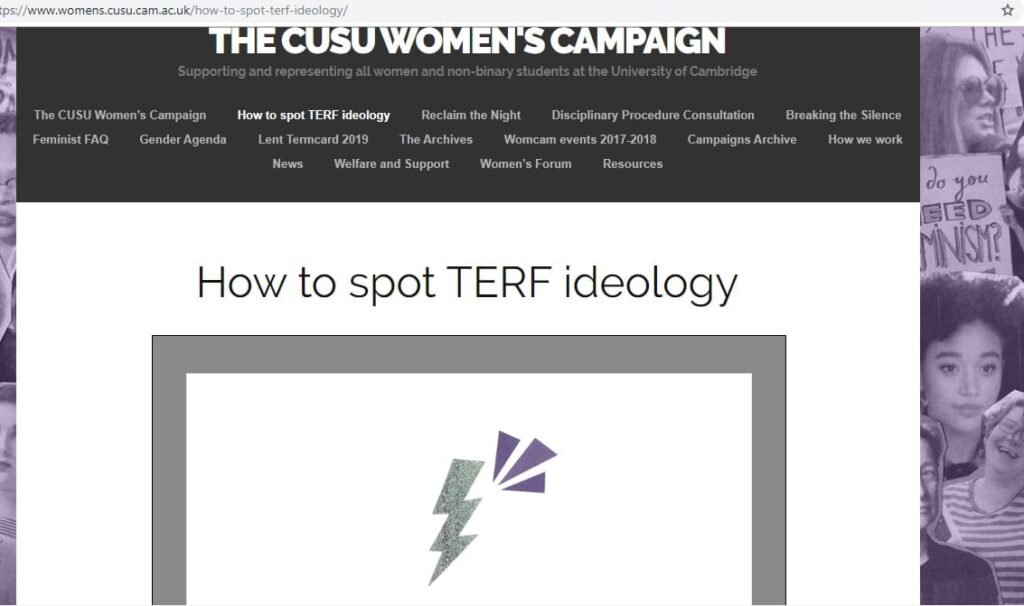Challenging and disrupting the process of self-objectification is a crucial component of women’s liberation in the current climate.


Cambridge University now has a pole dancing society while radical feminism is hunted on campus.1
Girls and women are being taught to self-objectify, ready to be used and exploited by men, potentially sold and consumed by men, through ‘liberal feminism’ [the anti-feminist backlash]. To make themselves pornified, packaged and advertised online to men. This is clear in the expediential rise of OnlyFans, a website where majority young women sell pornographic images and videos of themselves to majority males.1 It is present in the rise of and pride in ‘Sugar Daddy’ prostitution, where a young woman agrees to sexually service a richer older male on retainer in return for gifts or university fees.2 It is clear in the sexy poses rather than joy or other emotions dominating the reems of photographs being uploaded to Instagram by young women. We see it in the prostitution recruitment stalls at universities such as the stall at Brighton University fresher’s fair. 3 We see it in the spread of Twerking as a dance and WAP being hailed as expressing female sexuality when it really expresses male projections and porn culture.
Girls and young women say they find it empowering, to be reduced to a f*ck toy. To have their value judged on what they look like. ‘Objectification theory posits that girls and women are typically acculturated to internalize an observer’s perspective as a primary view of their physical selves’.4 While ‘liberal feminism’ argues that choice is supreme, an individual choice by a woman thus renders a practice liberating, rather than harmful. It imbues whatever is chosen with agency, and this makes it empowering. This is of course all nonsense.
It is masculinist to think that reality can be altered by one’s words, abuse into pleasure, harm into empowerment, object into agent. Alexandra S. Rome and Aliette Lambert use the term ‘postfeminism’ to describe what I call ‘liberal feminism’. Rome and Lambert have argued that ‘Underpinning [the] notion of sexual entrepreneurship is a variant of (post)feminism, a catch-all term that imagines misogynistic ideals as empowering by leveraging feminist goals and language, like empowerment, confidence and sexual liberation. Postfeminism has come to dictate the ways women manage their physical, psychic and sexual lives. For example, media messages urging women to “lean in”, “love their bodies”, and “be confident” have cultivated a culture that calls on women to continuously strive towards perfection across all spheres of life’. 5
This perfection comes at a price as it is supposedly achieved through the consumption of products. This messaging locates failure in the individual and eradicates structural discrimination. The individual has not achieved success because they did not purchase/apply the correct product, their skin is too blotchy, they need one more diet or they are not sexy enough. If marketing was honest it would tell women ‘do what you want, the odds are stacked against you, you are second class in male supremacy, valued as an object for use’. Women still instruct other women in how to comply to male desires, just the number of those doing it and the product line have expanded.
It is a means of psychological oppression and it is causing mental health problems. By adopting an observer’s perspective and idea of themselves as ‘thing to be viewed’ and ‘instrument to please’ women and girls police themselves and each other and their desire to support the status quo is enhanced. They are less likely to challenge the status quo, even when it is detrimental to their interests. As Rachel Calogero has argued, ‘Women’s adoption of an objectified view of the self may be another way through which sexist ideology interferes with their taking the collective action necessary to improve social conditions and the relative status for women as a whole’. 6
Calogero outlines how ‘Self-objectification guides women’s attention to their appearance and leads them to comply with traditional gender roles (e.g., that of a sex object), thereby garnering their participation in the very system that maintains their disadvantaged status. In line with system-justification theory, participation in such a system requires one’s justification of it—hence the strong ideological endorsement by women of existing gender roles and relations’.7 Jojanneke van der Toorn and John T. Jost have outlined how ‘Justifying the social system serves the palliative function of alleviating emotional distress and enhancing subjective well-being’.8 This can be observed, for example, when women victim-blame other women. It is the idea that if I follow the rules I will succeed, or I won’t be subject to male violence. It is terrifying to accept the level of potential violence and discrimination one will face based on one’s sex. In addition, stability is soothing. I can understand women that choose to assimilate and not rock the boat. However, upholding sexism runs deeper. ‘System justification, like many other cognitive and motivational processes, may operate outside of conscious awareness’.9
This is why it is so difficult to shake.
Living in a culture of sexual objectification produces a colonised mind and alienation in women and girls. Frantz Fanon’s analysis of colonialism’s construction of psychological oppression is useful for feminist analysis.10
Sandra Lee Bartky applied Fanon’s ideas to women living under male supremacy in Femininity and Domination. Bartky argued that ‘to be psychologically oppressed is to be weighed down in your mind; it is to have harsh dominion exercised over your self-esteem’ and ‘the psychologically oppressed become their own oppressors; they come to exercise harsh dominion over their own self-esteem’.11 This is having a devastating impact on girls and women. Claire Shipman, Katty Kay and Jillellyn Riley have researched how ‘in their tween and teenage years, girls become dramatically less self-assured—a feeling that often lasts through adulthood’.12 They continue that ‘the female tween and early-teen confidence plunge is especially striking because multiple measures suggest that girls in middle and high school are, generally speaking, outperforming boys academically, and many people mistake their success for confidence’.13 Locating their self-worth in how they look and measuring it with how others respond to their appearance, a ‘like’ or comments, is helping to fuel a mental health crisis. According to the Samaritans, the suicide rate for females under 25 has increased by 93.8% since 2012. To its highest level in 2019. In the same year a long-term study was published which concluded that ‘One in five girls and young women in England aged 16 to 24 have cut, burned or poisoned themselves, according to research that mental health experts said was “very worrying”. In Reviving Ophelia Dr Mary Pipher analysed how at adolescence girls were being forced by our culture to split between the true self and the false self, who they were and what society demanded. She argued that training into femininity was to kill the self, a process of losing humanity.14
She assessed that this was the common root of the variety of mental health problems she was treating in adolescent girls, from anorexia to alcoholism. It was culture that was the problem. Of course objectification is not the only cause of teen girls mental health problems. With the rise in sexual assaults, and the continuing problem of incest, young women have a lot to face. Nevertheless, self-objectification and living in a misogynistic culture is causing teen girls to internalise the blame and preventing their resistance to the pressures.
Physiologically breaking resistance is necessary for the oppression of a large group of people, such as the 51% of the population that females make up. Frantz Fanon’s theory on how the colonised internalise the ideology of the colonizer, originally published in 1952, is important for feminist understanding of women as a group living under male domination.15
Bartky delineated that alongside ‘the experiences [Fanon] describes fall into three categories: stereotyping, cultural domination, and sexual objectification’.16 With regards to women stereotyping is rife and has gained a new popularity in gender identity which claims that stereotypes define a woman and are natural and innate. Women live under cultural domination, we live in a male dominated culture, our curriculums teach the achievements of men and exclude women, it is organised for male pleasure, from ‘invisible women’ to male sports at the end of each news broadcast. Imagine only female sporting achievements being reported every night. Why not art, why not acts of social good? Women are sexually objectified, on an interpersonal level to a cultural level, from music to pornography, advertisements and reporting.
The oppression of women is so normalised as to appear to be the natural order. Bartky assessed how ‘psychological oppression is institutionalised and systematic; it servers to make the work of domination easier by breaking the spirit of the dominated and by rendering them incapable of understanding the nature of those agencies responsible for their subjugation’.17
Indeed, acculturation to this system starts young. How often do we hear little girls being praised because they look pretty? Girls clothing reinforces this with the messages emblazoned on them – girls are told to ‘be cute’ rather than be adventurous or rebellious. ‘Slogans aimed at girls are dominated by appearance, in particular themes around smiling and being pretty. 41% of girls aged between 9 and 10 believe that “women are judged more on their appearance than on their ability”.18 It thus makes sense to participate in this system, the girls realize that they will be rewarded or punished. The internet has amplified things. Objectification is all surrounding now, and social media means that girls and young women are immersed in it. From likes and comments on photographs to the construction of a self for public consumption.
As Andrea Dworkin articulated, ‘It is true, and very much to the point, that women are objects, commodities, some deemed more expensive than others – but it is only by asserting one’s humanness every time, in all situations, that one becomes someone as opposed to something. That, after all, is the core of our struggle’.19 Feminism needs to continue to challenge ‘liberal feminist’ self-objectification as this is designed to nullify the movement for women’s liberation. We need to give our young women early access to radical feminist ideas. Imagine what it would be like to have a generation of girls and young women with the mental space to contemplate rebellion and the self-esteem to try it.
Title taken from R. M. Calogero, ‘Objects Don’t Object: Evidence That Self-Objectification Disrupts Women’s Social Activism’, Psychological Science, Vol. 24, No. 3 (March, 2013), pp. 312 – 318.
- Cambridge University Pole Sports, http://pole.soc.srcf.net/
‘How to spot TERF ideology’, The CUSU Women’s Campaign,https://www.womens.cusu.cam.ac.uk/how-to-spot-terf-ideology/
- J. Bernstein, ‘How OnlyFans Changed Sex Work Forever’, The New York Times (9 February 2019), https://www.nytimes.com/2019/02/09/style/onlyfans-porn-stars.html
- M. Greep, ‘The TikTok guide to being a sugar baby: Women proudly flaunt their VERY expensive gifts including Cartier jewellery and Hermes bags as they share their tips for landing a rich older man’, Daily Mail (12 October 2020), https://www.dailymail.co.uk/femail/article-8823811/Sugar-babies-proudly-flaunt-expensive-gifts-TikTok.html
- ‘Sex worker stall at Brighton university freshers’ fair sparks row’, BBC News (1 October 2018), https://www.bbc.co.uk/news/uk-england-sussex-45703552
- B. L. Fredrickson & T. Roberts, ‘Objectification theory: Toward understanding women’s lived experiences and mental health risks’, Psychology of Women Quarterly, 21 (1997), p. 173.
- A. S. Rome & A. Lambert, ‘‘Narcissistic objectification’: The problem with the ‘pornification’ of pop culture’,Independent (26 July 2020),https://www.independent.co.uk/life-style/women/pornification-misogyny-sexual-liberation-pop-culture-a9630631.html
- R. M. Calogero, ‘Objects Don’t Object: Evidence That Self-Objectification Disrupts Women’s Social Activism’, Psychological Science, Vol. 24, No. 3 (March, 2013), p. 313.
- R. M. Calogero, ‘Objects Don’t Object: Evidence That Self-Objectification Disrupts Women’s Social Activism’, Psychological Science, Vol. 24, No. 3 (March, 2013), p. 317.
- J. van der Toorn J & J. T. Jost, ‘Twenty years of system justification theory: Introduction to the special issue on “Ideology and system justification processes.”, Group Processes & Intergroup Relations, issue 17, no. 4 (2014), p. 414.
- J. van der Toorn J & J. T. Jost, ‘Twenty years of system justification theory: Introduction to the special issue on “Ideology and system justification processes.”, Group Processes & Intergroup Relations, issue 17, no. 4 (2014), p. 414.
- F. Fanon, Black Skins, White Masks (New York, Grove, 1967).
- S. L. Bartky, Femininity and Domination: Studies in the Phenomenology of Oppression (Routledge, London, 1990), p.22.
- C. Shipman, K. Kay & J. Riley, ‘How Puberty Kills Girls’ Confidence’, The Atlantic (20 September 2018), https://www.theatlantic.com/family/archive/2018/09/puberty-girls-confidence/563804/
- C. Shipman, K. Kay & J. Riley, ‘How Puberty Kills Girls’ Confidence’, The Atlantic (20 September 2018), https://www.theatlantic.com/family/archive/2018/09/puberty-girls-confidence/563804/
- M. Pipher, Reviving Ophelia: Helping You to Understand and Cope with Your Teenage Daughter (London, Vermillion,1996).
- F. Fanon, Black Skins White Masks (Pluto Press, London, 1986).
- S. L. Bartky, Femininity and Domination: Studies in the Phenomenology of Oppression (Routledge, London, 1990), p.23.
- S. L. Bartky, Femininity and Domination: Studies in the Phenomenology of Oppression (Routledge, London, 1990), p.22.
- ‘Gender Stereotypes’, Let Clothes Be Clothes https://www.letclothesbeclothes.co.uk/gender-stereotypes
- A. Dworkin, Woman Hating (Plume, New York, 1974), p.83.








Posted by Mujer Enojada
31 October, 2020 at 11:58 pm
<3